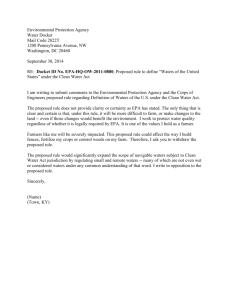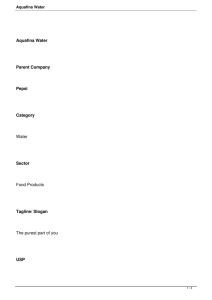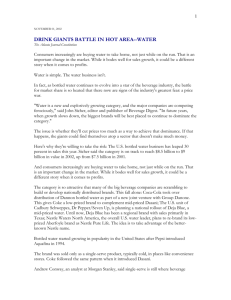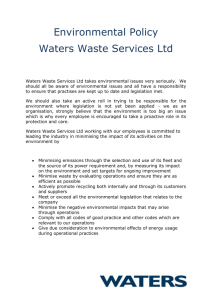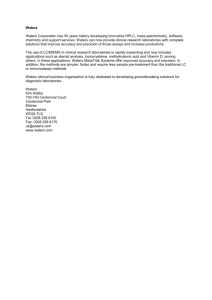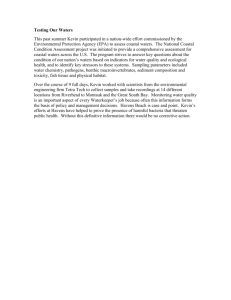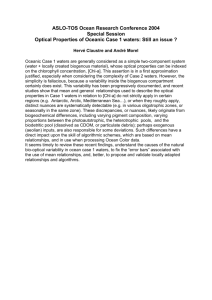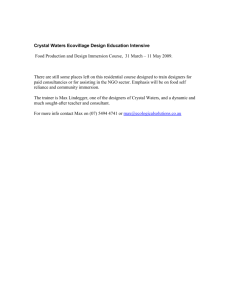Document
advertisement
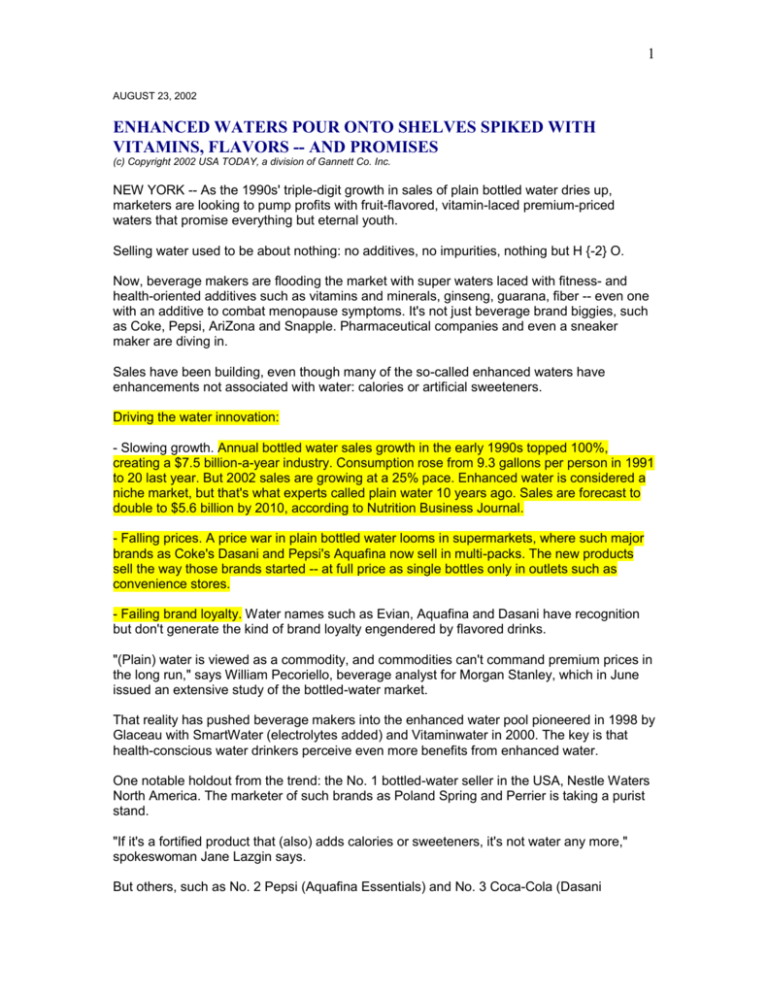
1
AUGUST 23, 2002
ENHANCED WATERS POUR ONTO SHELVES SPIKED WITH
VITAMINS, FLAVORS -- AND PROMISES
(c) Copyright 2002 USA TODAY, a division of Gannett Co. Inc.
NEW YORK -- As the 1990s' triple-digit growth in sales of plain bottled water dries up,
marketers are looking to pump profits with fruit-flavored, vitamin-laced premium-priced
waters that promise everything but eternal youth.
Selling water used to be about nothing: no additives, no impurities, nothing but H {-2} O.
Now, beverage makers are flooding the market with super waters laced with fitness- and
health-oriented additives such as vitamins and minerals, ginseng, guarana, fiber -- even one
with an additive to combat menopause symptoms. It's not just beverage brand biggies, such
as Coke, Pepsi, AriZona and Snapple. Pharmaceutical companies and even a sneaker
maker are diving in.
Sales have been building, even though many of the so-called enhanced waters have
enhancements not associated with water: calories or artificial sweeteners.
Driving the water innovation:
- Slowing growth. Annual bottled water sales growth in the early 1990s topped 100%,
creating a $7.5 billion-a-year industry. Consumption rose from 9.3 gallons per person in 1991
to 20 last year. But 2002 sales are growing at a 25% pace. Enhanced water is considered a
niche market, but that's what experts called plain water 10 years ago. Sales are forecast to
double to $5.6 billion by 2010, according to Nutrition Business Journal.
- Falling prices. A price war in plain bottled water looms in supermarkets, where such major
brands as Coke's Dasani and Pepsi's Aquafina now sell in multi-packs. The new products
sell the way those brands started -- at full price as single bottles only in outlets such as
convenience stores.
- Failing brand loyalty. Water names such as Evian, Aquafina and Dasani have recognition
but don't generate the kind of brand loyalty engendered by flavored drinks.
"(Plain) water is viewed as a commodity, and commodities can't command premium prices in
the long run," says William Pecoriello, beverage analyst for Morgan Stanley, which in June
issued an extensive study of the bottled-water market.
That reality has pushed beverage makers into the enhanced water pool pioneered in 1998 by
Glaceau with SmartWater (electrolytes added) and Vitaminwater in 2000. The key is that
health-conscious water drinkers perceive even more benefits from enhanced water.
One notable holdout from the trend: the No. 1 bottled-water seller in the USA, Nestle Waters
North America. The marketer of such brands as Poland Spring and Perrier is taking a purist
stand.
"If it's a fortified product that (also) adds calories or sweeteners, it's not water any more,"
spokeswoman Jane Lazgin says.
But others, such as No. 2 Pepsi (Aquafina Essentials) and No. 3 Coca-Cola (Dasani
2
NutriWater, coming later this year), have no such qualms about expanding their water
brands. Other brands diving in include Gatorade, Reebok, Long Life Beverages, TalkingRain
and even pharmaceutical company Baxter International.
The year already has seen 34 new brands vs. 17 in 2001 -- so many that a shakeout can be
seen.
"There's going to be an over proliferation of new products," says Caroline Levy, beverage
analyst with UBS Warburg. "A lot of new products launched this year won't be around a year
from now."
Pricing power
The boom in bottled water, which trails only soft drinks in beverage popularity, brought
healthy profits in the 1990s, but sliding prices are cutting margins.
Average supermarket prices for bottled water this year are down 3.4% through July vs. the
same period last year, according to supermarket tracker IRI. Some brands are cutting
aggressively: Aquafina prices are down 9% through July.
Marketers are looking to protect their shares and margins with the enhanced waters, which
sell at prices up to 40% higher than standard bottled waters.
"We are helping arm ourselves against lower pricing, but it's about brands as well," says
Kellam Graitcer, brand manager for Coke's Dasani, about the decision to launch NutriWater.
"We are looking at NutriWater as part of a whole Dasani brand portfolio."
Water brand loyalty has been elusive. Just 10% of water consumers vs. 37% of soft-drink
consumers describe one product as "my favorite brand," says the Morgan Stanley study,
which polled 2,000 consumers.
Water marketers "have to attempt to build out the brand equity, and they're experimenting,"
Pecoriello says. "Coke and Pepsi want to play everywhere and to get in on the ground floor."
For more than thirst
The enhanced waters -- also dubbed functional, fortified, fitness or designer waters -promise health benefits beyond mere hydration.
They claim to rejuvenate, replenish and restore the body, even to enhance vision, stamina or
brain power with names that sound more like aromatherapy than beverages. Glaceau has 20
colors and tastes for general mental stimulation and physical rejuvenation.
Others, such as Baxter's Pulse, have ingredients aimed at actual ailments. Its women's
formula, for instance, has 7 milligrams of soy isoflavones "to reduce the occurrence of
symptoms associated with menopause." A heart-healthy formula contains soluble fiber to
promote "regularity."
Some brands, including Gatorade Propel and Reebok Fitness Water, promise the benefits of
sports drinks. They have electrolytes and some carbohydrates, but fewer calories and a
lighter taste. Propel has 10 calories per 8-ounce serving; regular Gatorade has 50.
Gatorade's goal is not to compete against its sports drink, but to capture water drinkers.
3
"When you are hot and thirsty, tap water is still huge," says Marie Devlin, marketing director
for Propel, who says 38% of all water consumed still is taken from the tap. "But occasionally,
people are bored with water's taste. We know from 35 years of research that people will
drink more of a lightly flavored beverage, and we know there's a group of consumers who
don't like the taste or color of Gatorade."
Tapping health worries
The products come at a time when Americans are generally more health conscious, but
many worry that they fall short of proper nutrition.
They may be right. A study in The Journal of the American Medical Association in June
found the average American gets enough vitamins to prevent deficiencies but not to prevent
disease. Insufficient vitamin intake "is a risk factor for chronic diseases, and common in the
general population," it says.
Many buyers of vitamin-enhanced waters, especially female baby boomers, see them as an
easy way to stock up on nutrients. "Baby boomers want to stay young, healthy and active,
and they are seeing chronic conditions come on," says Karen King, marketing director at
Baxter International.
"This category appeals to people best described as health conscious, not health nuts," says
Robin Kaminsky, director of Pepsi's non-carbonated beverages.
"They know they should be getting more vitamins but don't have the time."
Pepsi uses time-crunched TV talk show host and working mom Kelly Ripa in TV ads talking
about the "oomph" she gets from Aquafina Essentials.
But nutritionists warn that the enriched waters have relatively small amounts of vitamins or
minerals and should not replace regular vitamin supplements.
For instance, it would take 10 bottles of water laced with calcium to provide the daily
recommendation of 1,000 milligrams, says Leslie Bonci, director of sports medicine nutrition
at the University of Pittsburgh Medical Center.
"You'll be skimping and shortchanging yourself on most vitamins and minerals if you're
relying on enhanced water," says Bonci, who is a registered dietician. "You take it for the
taste and fluid intake, but taking a vitamin with water is the better thing to do."
Good taste at a cost
A key problem for enhanced beverage makers is that many of the health additives don't
enhance the taste. Even in small doses, many, including vitamins, fiber, folic acid or calcium,
leave a bad flavor.
That's why marketers camouflage the taste with sweeteners and berry, citrus and other
flavorings.
"It's a complicated product," Dasani's Graitcer says about development of the four Dasani
flavors due at the end of the year. "We want to make sure that what we provide tastes good."
But adding taste often adds calories or artificial sweeteners -- not necessarily what healthminded consumers are looking for. While Propel and Reebok have 10 calories per 8-ounce
4
serving, Glaceau has 50, and Aquafina Essentials has 40. (Coca-Cola Classic, by
comparison, has 100 calories per 8 ounces.) And most of the products are sold in 16- to 20ounce bottles.
"We knew from experience that the consumer is coming at this from water and likes the fact
that water has a bunch of zeros," says Jonathan Cronin, vice president of marketing for
Clearly Canadian, maker of Reebok water. "We wanted to deliver on that. We've got 30
calories per (24-ounce) bottle, and that's acceptable. Otherwise, you're drinking sugared
water."
Clearly Canadian knows the perils of sugar in the health-conscious market. The company
helped pioneer New Age beverages in the early 90s with clear, fruit-flavored carbonated
waters. But sales shrank when consumers starting counting the calories.
While marketers see enhanced waters as the new growth product, some retailers cramped
for space in their coolers want more results before committing.
For example, 7-Eleven, one of the country's biggest sellers of single-serving beverages, is
not emptying much shelf space yet for supercharged waters.
"We haven't seen one brand that (beverage) managers are jumping up and down about,"
says Mike Blair, 7-Eleven's product director for cold beverages.
"Whether it works, we'll let the sales data tell."
